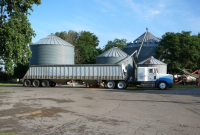Support strong Canadian climate journalism for 2025
A push to eliminate Toronto’s single-use plastic waste has spawned a fledgling market for reusable takeout containers, but restaurants and customers still struggle with limited availability and other inconveniences.
“I love to order food and eat [from] reusable containers instead of plastic boxes,” said Haseeb Bekzad, a resident of North York. “But not all restaurants have this service, unfortunately.”
And while Bekzad supports reusables over plastic, he believes current logistical barriers are forcing him to choose between two evils: throwaway containers versus the extra driving to return them.
“I ordered my favourite food with reusable containers, and it was delivered all the way from downtown Toronto, and it took me 40 minutes to drive and deliver back the containers to the same restaurant,” he said.
“I think it would be great if all these companies that provide reusable containers … somehow have shared places and items for their services so that restaurants and customers have easy access to their services,” said Bekzad.
Environmental advocates also believe the most efficient model would be for groups of businesses to adopt a standard set of containers and pool them together so they can be returned to many different locations, sorted, washed and redistributed.
“We support reuse and refill systems as a replacement for single-use plastic packaging, including for restaurant takeout,” said Karen Wirsig, senior program manager at Environmental Defence. “It is good to see small businesses emerging to fill this need in Toronto, but we can't rely on these businesses to solve the problem on their own.”
A widespread, convenient and affordable system is needed to replace throwaway packaging, some of which ends up in nature where it harms animals and their habitats, Wirsig added.
The most important thing about a reuse system is ensuring high return rates of containers after each use — ideally, 90 per cent.
“What you don't want is so-called ‘reusable’ containers that are only ever used once or twice,” she said.
Wirsig believes a regulatory framework is needed to set up effective reuse systems. This would include an expanded federal ban on all single-use plastic takeout containers — importing checkout bags, cutlery, foodservice ware, stir sticks and straws made from single-use plastic was officially banned last December — and targets for a refill of packaging, Wirsig said.
Owners of existing reusable container services agree working together would expand the number of restaurants willing to adopt reusables.
Erika Reyes, president of zero-waste takeout app Inwit, told Canada’s National Observer she would love to collaborate with other businesses, but it would take more resources to bring business owners together.
“Our customers are everywhere, but we have a location problem to store our containers, and also some customers can’t bring back the containers on time,” she said. “I would love to scale this solution, and I would love to work with other companies to be able to have their takeout because we want to serve, but we have to be fast, convenient and cheap.”
Inwit, which is based in Toronto and started its operation four years ago, has more than 600 customers and works with 16 restaurants and some big corporate clients like the University of Toronto and the City of Toronto.
“In order to get this to scale, we need to work on a business model that works for everyone,” said Megan Takeda-Tully, founder and CEO of Suppli, a reusable container supply service.
“It takes time because it is a new concept, but I think the government should help with legislation for shared infrastructure, washing location, drop-off location.
“I've been in touch with many different entrepreneurs. I think it's important to be able to share learnings and talk about the challenges so we can find better solutions,” she added.
This story was produced in partnership with Journalists for Human Rights for the Afghan Journalists-in-Residence program funded by the Meta Journalism Project.






Comments
WHEN I WAS A BOY...
...we had takeout. It came in cardboard containers, often waxed cardboard. It could start to drip if you delayed a half hour. Was that really so intolerably bad?
Food courts in shopping malls would be a great location for re-usable dish-ware and silverware. The mall owners would provide a central dishwashing facility and all the little outlets would use the same dishes.
Food scraps and napkins would go into the compost